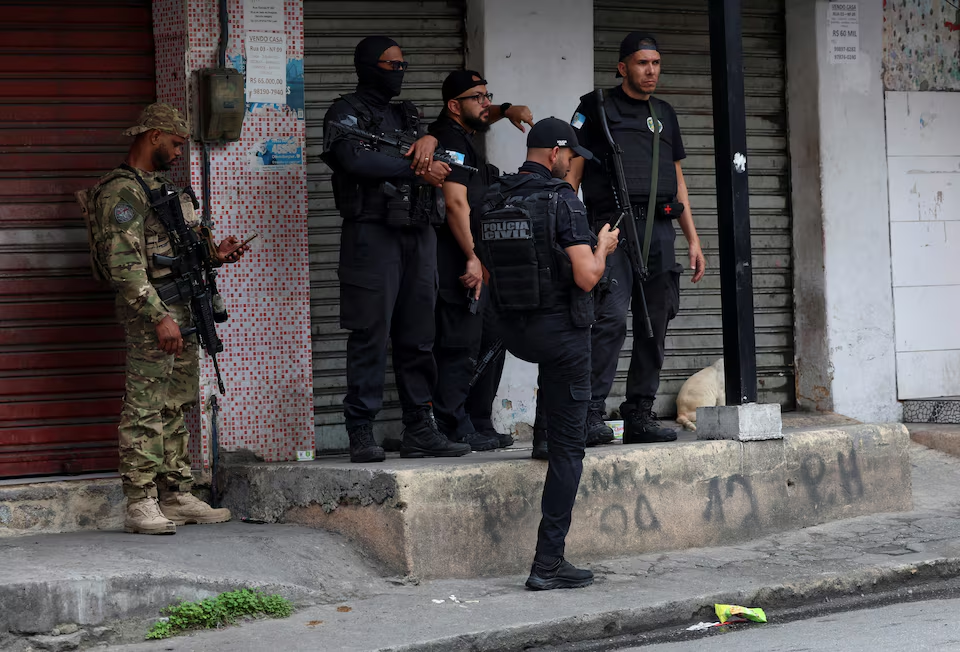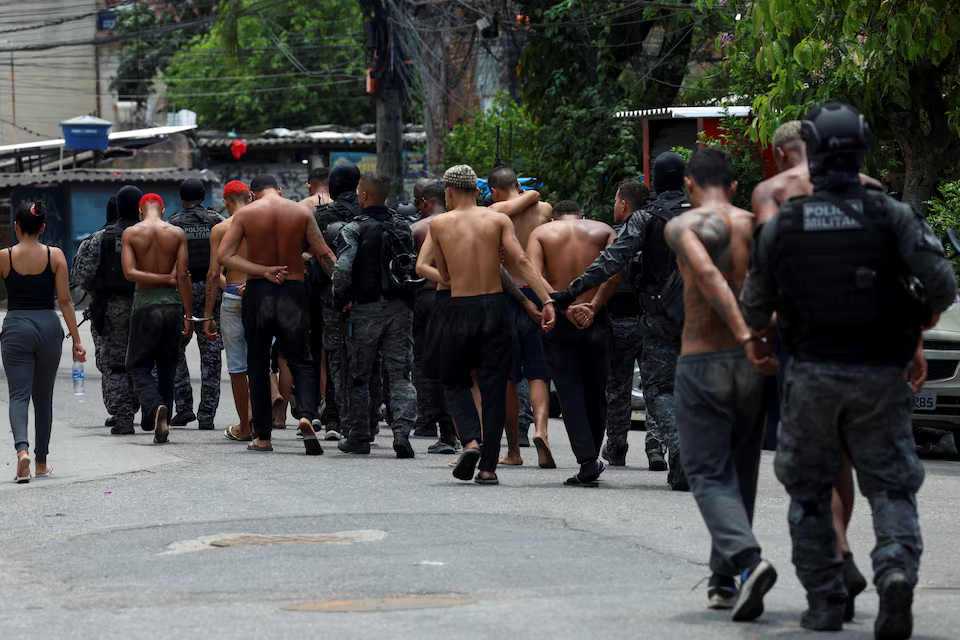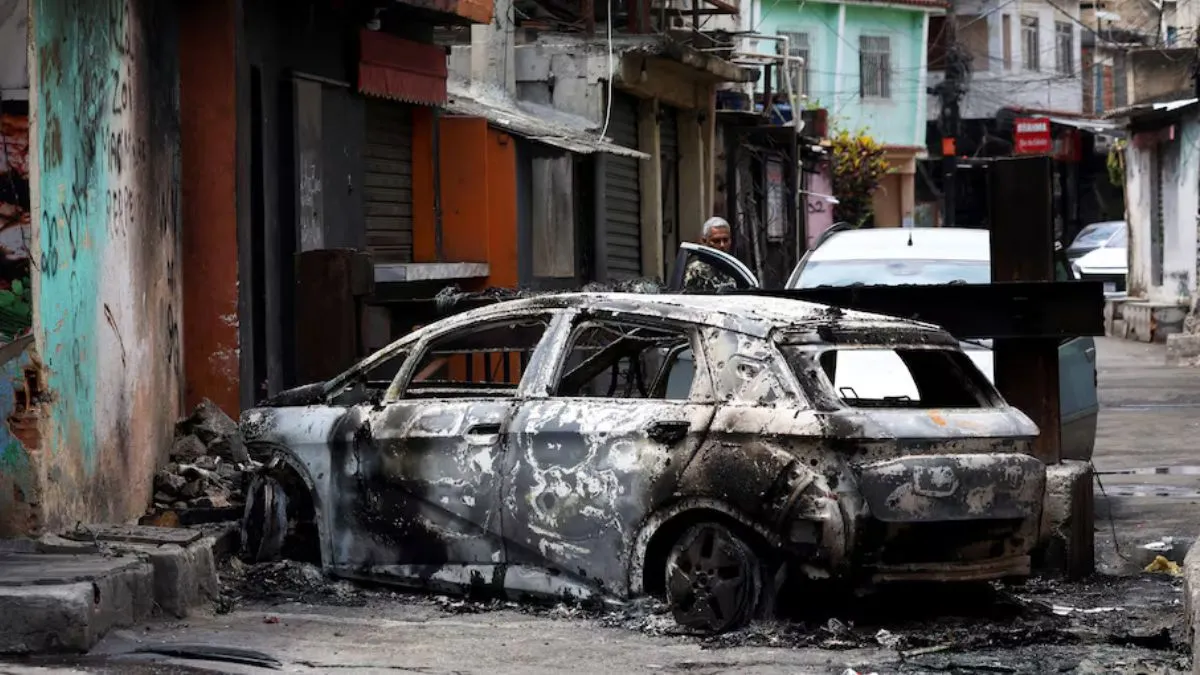- By Ajeet Kumar
- Wed, 29 Oct 2025 08:16 AM (IST)
- Source:JND
Rio de Janeiro Violence: About 2,500 Brazilian police and soldiers launched a massive raid on a drug-trafficking gang in Rio de Janeiro on Tuesday, arresting 81 suspects and sparking shootouts that left at least 64 suspects and four police officers dead. The operation was launched ahead of Cliamte Summit, COP30.
Why is Brazil carrying massive raid on drug gangs?
The operation included officers in helicopters and armored vehicles and targeted the notorious Red Command in the sprawling low-income favelas of Complexo de Alemao and Penha, police said.

(CREDIT: REUTERS)
The police operation was one of the most violent in Brazil’s recent history, with human rights organizations calling for investigations into the deaths. Police have often conducted large-scale operations against criminal groups ahead of major events in Rio, which hosted the 2016 Olympics, the 2024 G20 summit and the BRICS summit in July.
60 criminals killed
Rio’s state Governor Claudio Castro said in a video posted on X that 60 criminal suspects were “neutralized” during the massive raid that he called the biggest such operation in the city’s history. Some 81 suspects were arrested, while 93 rifles and more than half a ton of drugs were seized, the state government said, adding that those killed “resisted police action.”
Rio’s civil police said on X that four officers died in Tuesday’s operation. “The cowardly attacks by criminals against our agents will not go unpunished,” it said. An unknown number of people were wounded.

(Members of the military police special unit detain suspected drug dealers during a police operation against drug trafficking at the favela do Penha, in Rio de Janeiro, Brazil | CREDIT: REUTERS)
What UN says about Rio De Janeiro violence
The United Nations’ human rights body said it was “horrified” by the deadly police operation, called for effective investigations, and reminded authorities of their obligations under international human rights law.
Cesar Munoz, director of Human Rights Watch in Brazil, called Tuesday’s events “a huge tragedy” and a “disaster.” “The public prosecutor’s office must open its own investigations and clarify the circumstances of each death,” Muñoz said in a statement.
Schools shut
Footage on social media showed fire and smoke rising from the two favelas as gunfire rang out. The city’s Education Department said 46 schools across the two neighborhoods were closed, and the nearby Federal University of Rio de Janeiro canceled night classes and told people on campus to seek shelter.
Suspected gang members blocked roads in northern and southeastern Rio in response to the raid, local media reported. At least 70 buses were commandeered to be used in the blockades, causing significant damage, the city’s bus organization Rio Onibus said.
The operation Tuesday followed a year of investigation into the criminal group, police said.
Gov. Castro, from the conservative opposition Liberal Party, said the federal government should be providing more support to combat crime — a swipe at the administration of leftist President Luiz Inácio Lula da Silva.
Gleisi Hoffmann, the Lula administration’s liaison with the parliament, agreed that coordinated action was needed but pointed to a recent crackdown on money laundering as an example of the federal government’s action on organized crime.
Vice President Geraldo Alckmin and a number of ministers met in response to the operation on Tuesday afternoon. Chief of Staff Rui Costa requested an emergency meeting in Rio on Wednesday, with him in attendance as well as Justice Minister Ricardo Lewandowski.
Emerging from Rio’s prisons, the Red Command criminal gang has expanded its control in favelas in recent years.
How Brazil has a history of mass criminals killings
Rio has been the scene of lethal police raids for decades. In March 2005, some 29 people were killed in Rio’s Baixada Fluminense region, while in May 2021, 28 were killed in the Jacarezinho favela.
While the Tuesday’s police operation was similar to previous ones, its scale was unprecedented, said Luis Flavio Sapori, a sociologist and public safety expert at Pontifical Catholic University of Minas Gerais.
“What’s different about today’s operation is the magnitude of the victims. These are war numbers,” he said.
(With inputs from agency)

